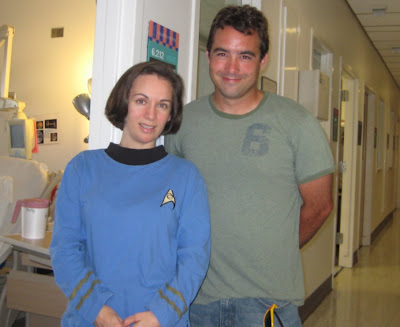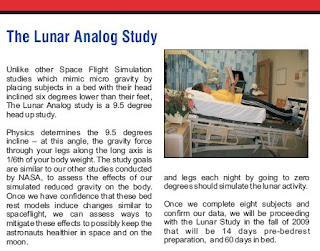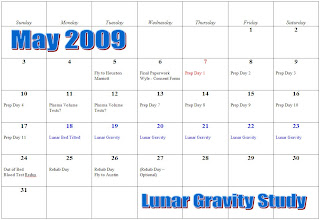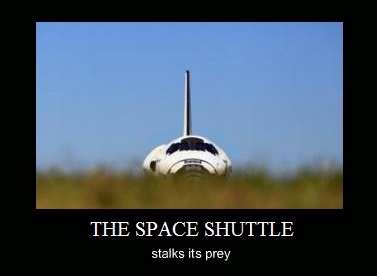Yesterday was my last day in the lunar tilt, so this morning I am "back on Earth!" Today is all about vital signs, and ensuring they don't skyrocket, or plummet. Upon waking, Nurse Jackie was at my side before I even had my lights on, and took the usual blood pressure and pulse.
And unlike a sudden hurricane scare, here's what happens in the
usual rise-from-bedrest process!
6:00 - Blood Pressure 97/57 - Pulse 81Just woke up, still lying down.
6:30 - BP 93/57 - Pulse 60
Bed angle changed to +30 degrees forward. Noticed a bit of ache in the lower back but nothing sharp. Immediately got the hiccups for some weird reason!
7:00 - BP 99/57 - Pulse 73
Bed angle changed to +45 degrees forward. Monitor helped me pull my laptop out of the table-springs, and I was able to put it on my lap as I sat up. Had a few moments of feeling light-headed, but still pretty relaxed.
7:15 - Breakfast
7:45 - BP 106/67 - Pulse 85
Nurse Bonnie put bed as far forward as it would go, then used a foam wedge to set my mattress to +90 degrees. Vitals clearly climbing, but no real changes in feeling.
8:00 - BP 113/67 - Pulse 75
Just checking. BP up, but pulse down. Body trying to figure out what the heck is going on, LOL...
8:15 - BP 110/67 - Pulse 91
Turned and dangled my feet over edge of bed. Can feel some toe tingles.
8:30 - BP 91/73 - Pulse 91
Kicking outward, stretching, taking deep breaths.
8:35 - BP 118/72 - Pulse 115
Felt a bit of a heart race, so they took vitals before the next time marker... quite a sudden spike! Body attempting to re-adjust to being upright.
8:45 - BP 112/70 - Pulse 100
At proper marker, equalizing a bit...
8:50 - BP 106/82 - Pulse 82At this point, I was finally given the go-ahead to STAND UP. And it's amazing how much you appreciate standing up when you haven't been able to for awhile. There was a flash of pain in the soles of my feet, but OH, nowhere NEAR as acute as last time. Still registered in the nerves, but tame in comparison.
9:00 - BP 143/85 - Pulse 128YOW. Major upswing, and probably the highest pressure numbers I've ever seen...but didn’t seem heart-pounding or anything. Once up, I wanted to WALK, but was advised to just stay standing still for awhile.
9:10 - BP 110/66 - Pulse 118Regulating. The good news (and another improvement over last time) was no dizziness, no nausea... so this tilt is not as taxing on the equilibrium. Shifted weight from leg to leg, raised each off the ground to bend the knees. Balanced on one foot and then the other. A bit stiff, but no real pain in the legs. Awesome.
9:20 - BP 113/76 - Pulse 115Took my first slow walk around the ward (one circle around our end of the facility is about 100 steps) with Bonnie & Elva on either side, and kept the BP cuff on in case I had any sudden symptoms while moving.
Nurse Bonnie said fluctuations were expected, but that I was pretty stable, all things considered. Of course, we never really see any data but our own, so we have no real comparisons. I guess it’s just considered "good news" if you don’t faint dead away on the floor. Bad news would be hitting any extreme high or low.
9:30 - BP 110/66 - Pulse 111
Walked around the ward twice, resting in between, and talking to everyone. Many kindly congratulated me on completing the bedrest phase.
9:45 - BP 106/55 - Pulse 106Walked around the ward three times, then got back onto the bed to put heating pad on my lower back, which was twinging a bit. Foot soles definitely sore by then! So, I stayed still and just watched CNN for awhile.
10:15 - BP 91/64 - Pulse 107
Vital signs returned to my normal resting range, so I got up again. Walked around ward 5 times, making an effort to go faster and take deep breaths. Got rolling at quite a swift gait... but now I'm remembering last year, and how depressing it is not to be able to RUN ;)
10:30 - BP 121/75 - Pulse 111Post-exercise vitals check yielded good numbers. Awesome. Feeling great! I sat down again for about an hour to write and relax, because I learned [the hard way] that if you move around "too much" or "too quickly" on unused muscles, you truly pay for it the next day.
Next up... finally a hot shower where I can wash my hair properly!









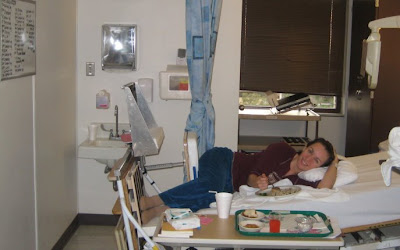






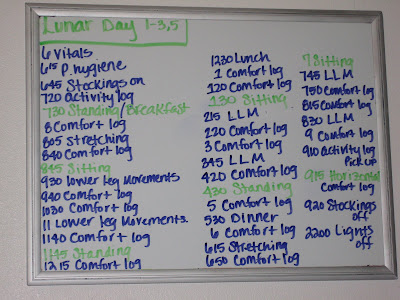 This is the standard schedule for days 1,2,3 and 5. On day 4, there's a deviation for massage therapy... then on day 6, another deviation for a repeat of the plasma volume testing. At first glance it looks crazy, so when I first got it, I typed it out so I could review it more carefully, getting an idea of the patterns:
This is the standard schedule for days 1,2,3 and 5. On day 4, there's a deviation for massage therapy... then on day 6, another deviation for a repeat of the plasma volume testing. At first glance it looks crazy, so when I first got it, I typed it out so I could review it more carefully, getting an idea of the patterns:










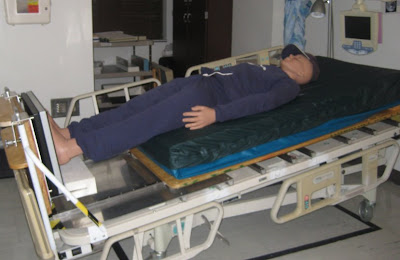 They told me her name was Melissa... I keep asking her where she's from, what she does for a living, how she likes it here on Galveston Island, but it's no use. Just not the chatty sort, I guess.
They told me her name was Melissa... I keep asking her where she's from, what she does for a living, how she likes it here on Galveston Island, but it's no use. Just not the chatty sort, I guess.
